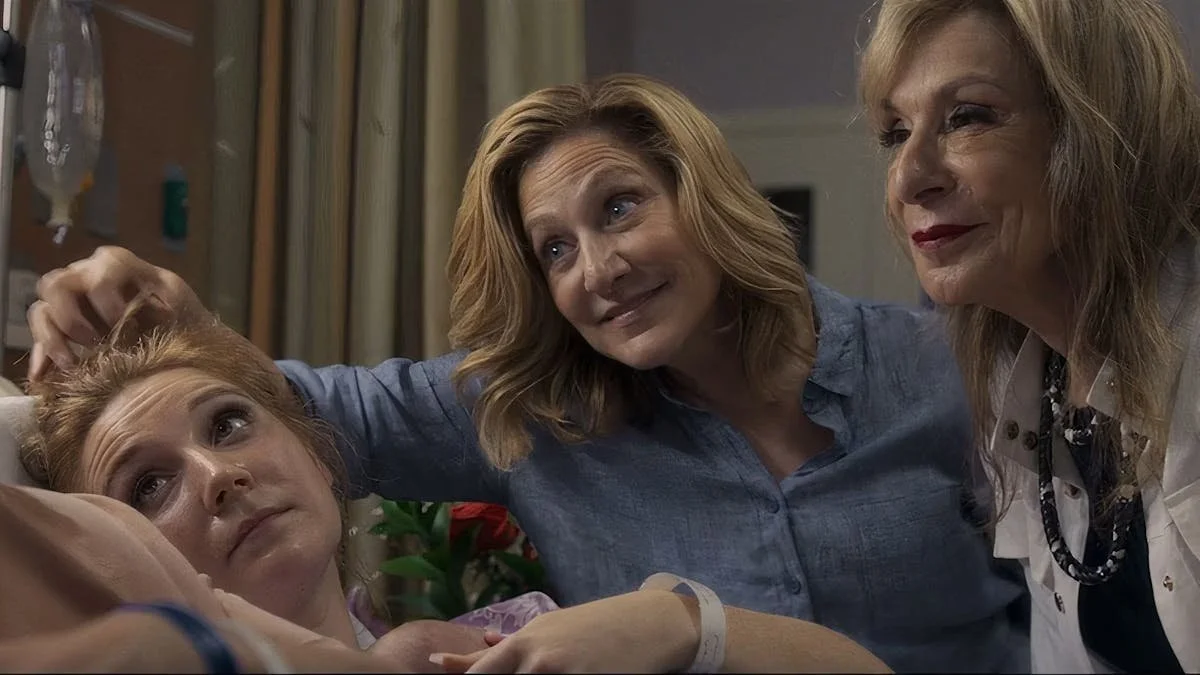I'LL BE RIGHT THERE is a shallow story, wasting gifted actors
I’ll Be Right There
Directed by Brendan Walsh
Written by Jim Beggarly
Starring Edie Falco, Jeannie Berlin, Bradley Whitford, Kayli Carter
Runtime: 97 minutes
In theaters September 6
by Christine Freije, Staff Writer
Edie Falco played one of the thorniest and most complex women in television history for six seasons on The Sopranos. Her subtle, rich, and fearless depiction of Carmela, the mafia family matriarch, is thrilling and unnerving. In every moment of her performance, Falco lays bare Carmela’s complex and contradictory wants and needs—the desire to be a good Catholic and to benefit from her husband’s criminal actions, to be a loving mother and to distance herself from her family, to wield power and to pretend that she has none.
In the new comedy, I’ll Be Right There, directed by Brendan Walsh, Falco once again plays a suburban mother with a complicated family, and her excellent craft is again on display. Unfortunately, her character, Wanda, as written by Jim Beggarly, is a blank. She has no hidden desires, no sense of moral confusion, and no urgent needs to satisfy. Even though the movie has charming comedic moments, a stacked supporting cast (Jeannie Berlin! Bradley Whitford!), and an unconventional approach to a romcom plot, it feels shallow and purposeless. The story glides along for 97 pleasant minutes but seems to deposit our protagonist right back where she started.
The film opens with a typical day in Wanda’s life. She drives around her small town tending to the needs of her family: her grown children, Mark and Sarah (Charlie Tahan and Kayli Carter), her mother, Grace (Berlin), and, occasionally, her ex-husband, Henry (Whitford). She lovingly packs them lunches, rushes them from appointment to appointment, and coaches them through small crises. At night, she works as a bookkeeper for restaurants and bars and spends time with her boyfriend Marshall (Michael Rapaport) and her new secret girlfriend, Sophie (Sepideh Moafi). There are things about her life that she finds frustrating—she’s furious when her mother won’t quit smoking after a leukemia diagnosis, her 8-month pregnant daughter is demanding a fairytale wedding before her due date, her ex-husband is a flake, and her son gets kicked out of therapy for telling outrageous lies—but none of these issues ever evolves into a major conflict. Wanda loves how she spends her days. After a long night of work, she doesn’t choose to unwind by herself or with her boyfriend or her girlfriend—she takes her mother and daughter out for ice cream.
Many stories about motherhood explore the difficulty of maintaining one’s own sense of self while raising children. But in I’ll Be Right There, Wanda insists that all she wants out of her life is to be with her family. The problem, as she sees it, is that the people around her keep telling her that her devotion is misguided. Late in the film, Henry asks her to imagine what will happen if her children move away and she can no longer see them every day. What will she do with her time? The movie dodges the question by portraying her ex-husband as an unreliable prick (the kind of character Whitford was born to play), but he has a point! Children grow up, move away, and start families of their own, and parents find new roles to play.
In a few key scenes, the movie touches on how Wanda’s commitment to her family makes her feel entitled to control their lives. She’s furious at her mother for staying out late at the casino. She feels betrayed when her son enlists in the army without telling her. But the movie shies away from this dynamic, rather than embracing the complex questions it raises. In Falco’s hands, Wanda walks the tightrope of the “ideal” mother: she’s good at her job but not career-obsessed, she dates but doesn’t really care about sex, and she supports her children but isn’t afraid to give them some tough love.
Wanda’s devout selflessness contrasts her girlfriend Sophie’s voracious self-indulgence. Sophie shows up at Wanda’s house, often late at night after hitting the bars with friends, asking for a lot of sex and not much conversation. She seems determined to keep Wanda out of her social life, to not get too tied up in a relationship, and to show up when it’s convenient for her, rather than when she’s needed. Moafi skillfully plays her as a woman who knows how to get what she wants, her manipulation hidden under layers of seduction and charm. As a form of queer representation, this depiction of Sophie as primarily sex-driven and selfish is disappointing, but Wanda could learn something from her about building a life outside of the contours of other people’s needs.
In The Sopranos, Edie Falco turned modern American motherhood inside out and served it to us in all its messy, ambiguous, selfish glory. In I’ll Be Right There, she gives us a rosy picture of motherhood’s trials and tribulations, but she has no character, plot, or moral grey areas to sink her teeth into.


